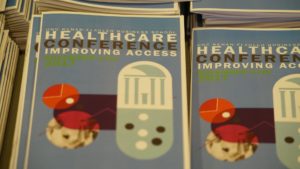News & Stories
The opioid crisis: Expert perspectives
 Misconceptions surround opioid use, abuse, addiction and recovery, according to experts speaking at UNC-Kenan Flagler Business School’s 2017 Healthcare Conference.
Misconceptions surround opioid use, abuse, addiction and recovery, according to experts speaking at UNC-Kenan Flagler Business School’s 2017 Healthcare Conference.
Sharing comprehensive perspectives about the opioid crisis – current and future – were Kevin Bingham, a managing director at Deloitte Consulting; Brendon Collins, brand manager at Eli Lilly & Company; Susan Kansagra of the North Carolina Department of Health and Human Services; and Louise Vincent, formerly with North Carolina’s Harm Reduction Coalition. Jon Easter, director at the Center for Medication Optimization through Practice and Policy (CMOPP) and a professor of the Practice|Division of Practice Advancement & Clinical Education at the UNC Eshelman School of Pharmacy, moderated.
Drug overdose is the leading cause of injury death in the U.S. and opioid overdoses account for about two-thirds of those deaths. The recent rise in opioid use and abuse is directly correlated with the introduction of synthetic opioids into the market. This epidemic is a huge problem in the health care field and the panelists addressed why it has been so hard to contain.
A huge roadblock in tackling the opioid epidemic is simply one of perspective, says Kansagra. We have a hard time understanding that drug addiction is a chronic disease, not a “moral failing or lack of willpower,” she says. The first step in handling this crisis effectively is to acknowledge and accept that treating drug addiction requires ongoing treatment and involves a lifetime of recovery, and treatment for opioid addiction should parallel that of other chronic diseases – like high blood pressure, or diabetes, she says.
Vincent spoke to similar misconceptions surrounding patient progress. “We dismiss people from care who continue drug use because we have the perception that there’s an on/off switch,” she says. The idea that recovery is a linear process and patients are either completely sick or completely well prevents us from treating opioid addiction as effectively as possible, she believes. In the past, Vincent has run an underground syringe exchange, fought for changes in legislation to legalize such work and struggled to overcome her own substance abuse and mental health issues.
Collins addressed the misconceptions from the perspective of a chronic pain specialist, considering the underlying issues of chronic pain and why opioid use is introduced in the first place. He suggests approaching the epidemic in two parts: investing in new and innovative treatments, and exploring alternative treatments for chronic pain other than opioids, such as acupuncture, medicinal marijuana, and nonpharmacological approaches.
Bingham discussed positive steps taken to address the epidemic. The number of days an opioid prescription lasts is often lowered to a more reasonable time frame, shortening the potential window for abuse, he says. He also noted that oftentimes the time period for which an opioid prescription is valid is also decreasing to eliminate using the drug when not medically necessary.
Bingham, Collins, Kansagra and Vincent’s diverse perspectives seemed to converge at one key point: effectively addressing the opioid epidemic will require an adjustment in perspective from users, abusers, prescribers and community members alike, on what causes opioid addiction, and how we view the disease.
By Madeline Stefan (BA ’18)